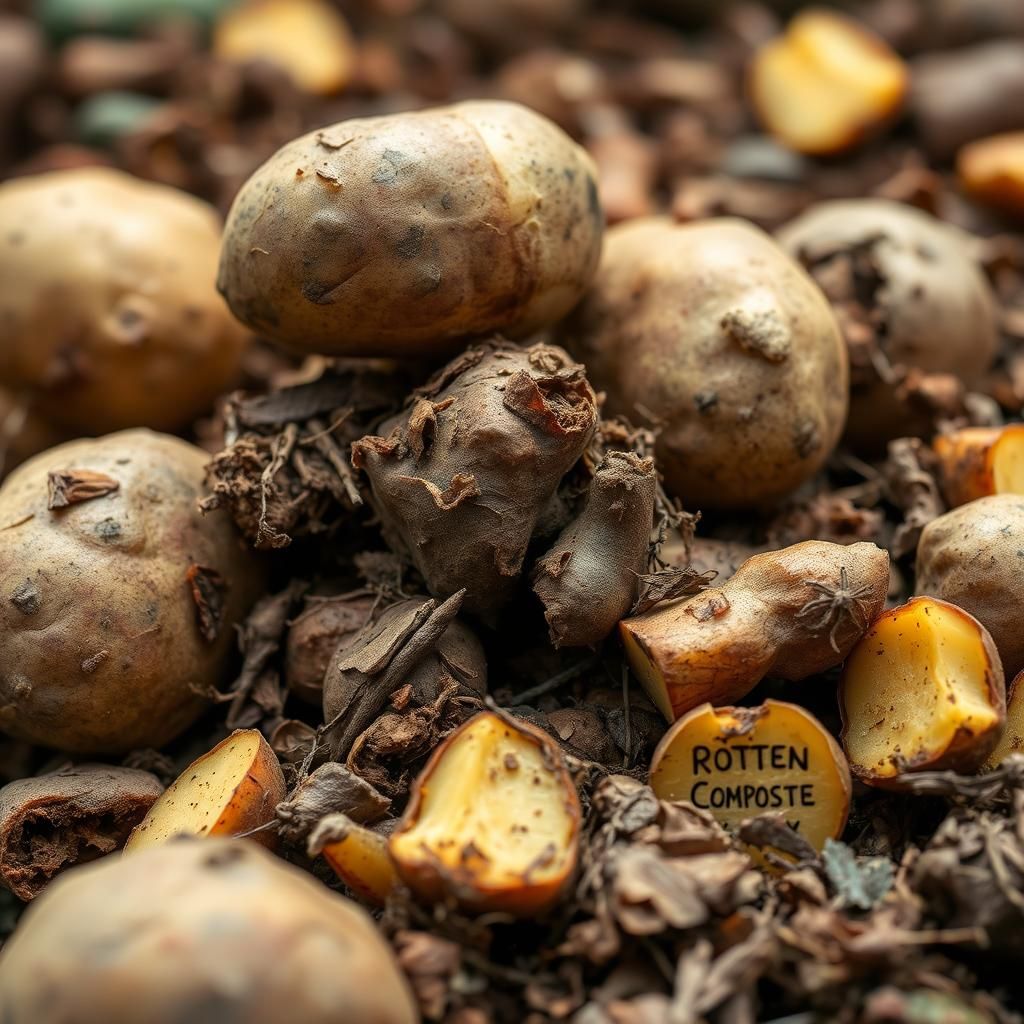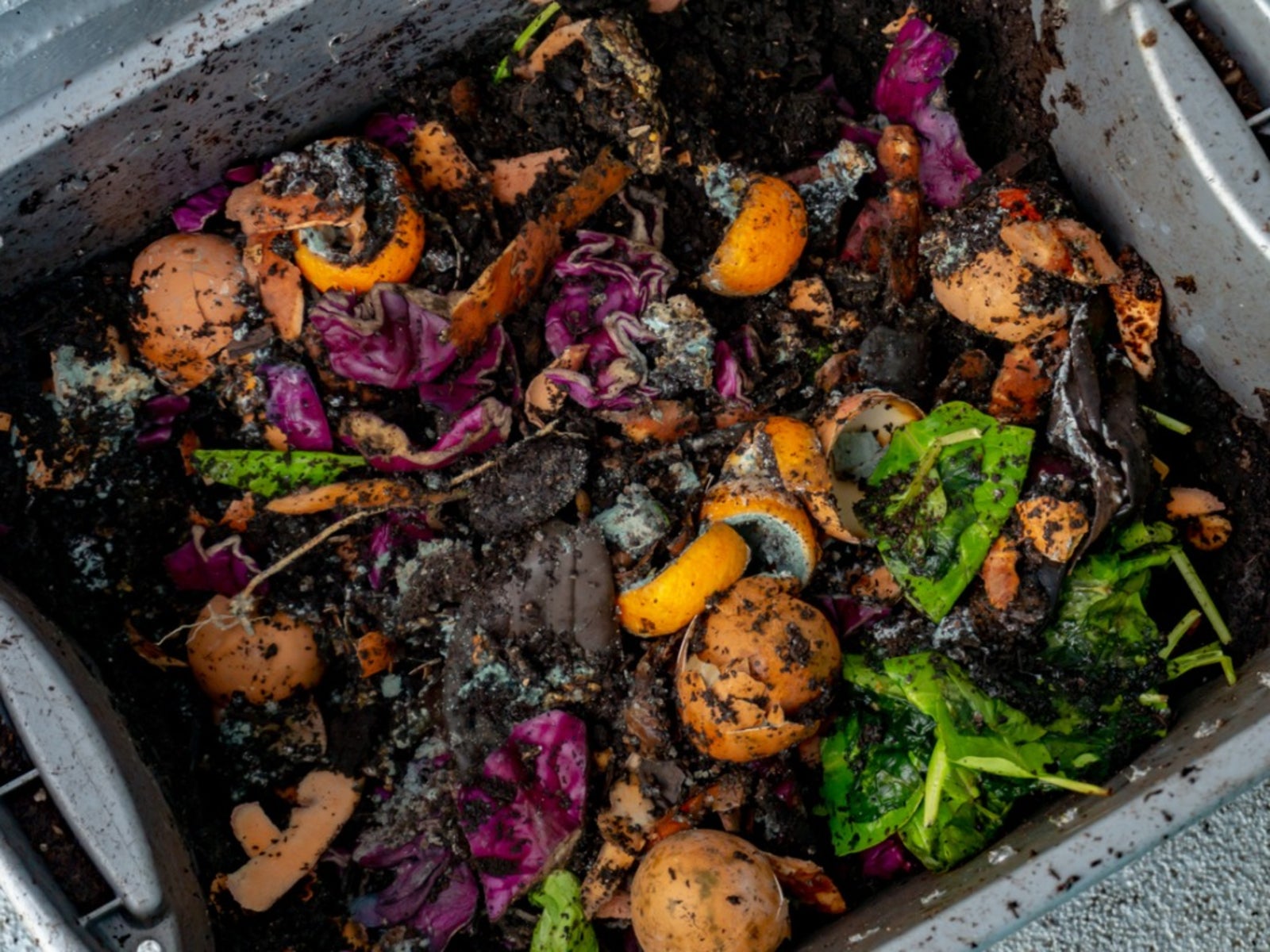Can You Put Rotten Potatoes in Compost? Assessing the Impact on Your Compost Pile

Composting is an environmentally friendly way to recycle organic waste, but it raises questions about what materials can be safely included. One common query among gardeners is whether rotten potatoes can be added to a compost pile. As these tubers decompose, they can potentially attract pests and introduce diseases, yet they also offer valuable nutrients to the compost. This article will delve into the pros and cons of adding rotten potatoes to your compost, examining their impact on compost quality, the potential risks involved, and best practices for maintaining a healthy and efficient composting system.
Can You Put Rotten Potatoes in Compost?
Yes, you can put rotten potatoes in compost, but there are a few considerations to keep in mind. Rotten or decaying potatoes will break down quickly, providing nutrients to your compost pile. However, if the potatoes are merely sprouting, it is best to avoid adding them to compost as they can produce potato beetles and other pests. Additionally, if they show signs of disease, such as blight, it's advisable to discard them instead of composting, as this can spread pathogens to healthy plants in your garden.
The Benefits of Composting Rotten Potatoes
Composting rotten potatoes can be beneficial as they are rich in nitrogen and can accelerate the composting process. When added to a compost pile, these vegetables help to create a well-balanced mix of green materials, which is essential for healthy compost. The breakdown of rotten potatoes also contributes to creating a nutrient-dense compost that enhances soil fertility and promotes plant growth.
Potential Risks of Composting Rotten Potatoes
While there are benefits, there are also potential risks associated with composting rotten potatoes. They can attract unwanted pests and rodents that are drawn to the decaying matter. Additionally, if the potatoes are diseased, composting them may spread pathogens throughout the compost pile, affecting the quality of the final product and potentially transmitting diseases to your garden plants.
How to Prepare Rotten Potatoes for Composting
To compost rotten potatoes effectively, it is important to chop them into smaller pieces before adding them to the pile. This helps speed up the decomposition process. Moreover, make sure to mix them with other compostable materials like dried leaves, grass clippings, or vegetable scraps to create a balanced compost mixture. This practice minimizes the risk of attracting pests while promoting faster breakdown.
Alternatives to Composting Rotten Potatoes
If you decide not to compost rotten potatoes, there are alternative methods for disposal. You can bury them deep in your garden to avoid attracting pests or simply add them to a municipal organic waste collection service if available in your area. Another option is to use them to feed animals, such as chickens, as long as they are not diseased.
Understanding When Potatoes Go Rotten
Potatoes typically go rotten due to excess moisture, failing to store them properly, or the presence of pathogens. Identifying the signs of rotting, such as a foul smell, soft texture, or dark spots, is essential. If you want to compost potatoes that are beginning to spoil, it's best to use those that show early signs of decay rather than those that are fully rotten and diseased.
| Aspect | Details |
|---|---|
| Benefits | Rich in nitrogen, enhances soil fertility |
| Risks | Attracts pests, potential disease spread |
| Preparation | Chop into smaller pieces, mix with other materials |
| Alternatives | Bury deep in garden, municipal waste services |
| Signs of Rotting | Foul smell, soft texture, dark spots |
Can I put rotten potatoes in compost?

Yes, you can put rotten potatoes in your compost, but there are several factors to consider to ensure that they benefit your compost pile rather than causing issues. Rotten potatoes can introduce nutrients and beneficial microorganisms to your compost; however, they may also bring about certain challenges.
1. Nutritional Value
Nutritional Value
Adding rotten potatoes can enhance the nutritional profile of your compost due to their high carbohydrate and starch content. As they decompose, they release essential nutrients such as potassium and phosphorous. These nutrients are vital for plant growth.
- Rich in nutrients that improve soil health.
- Contributes to a better organic matter ratio in compost.
- Provides microorganisms that aid in the breakdown of organic material.
2. Potential Pests and Diseases
Potential Pests and Diseases
While rotten potatoes can be beneficial, they also have the potential to attract pests like fruit flies and rodents. Furthermore, they may carry diseases such as late blight which could affect other crops in your garden.
- Risk of attracting pests if not adequately managed.
- Possibility of introducing diseases into your compost.
- Ensuring a well-balanced compost to mitigate risks.
3. Balance with Other Materials
Balance with Other Materials
A successful compost pile requires a balanced ratio of green (nitrogen-rich) and brown (carbon-rich) materials. Rotten potatoes, being rich in nitrogen, should be balanced with browns to maintain an ideal composting environment.
See also:
- Mix with dry leaves or cardboard to maintain balance.
- Aim for a carbon-to-nitrogen ratio of about 30:1.
- Monitor moisture levels to ensure proper decomposition.
4. Composting Techniques
Composting Techniques
When adding rotten potatoes, consider the composting method you are using. Hot composting methods can help break down materials more effectively, reducing the risk of smell and pests.
- Use a hot compost method for quicker decomposition.
- Chop rotten potatoes into smaller pieces to speed up breakdown.
- Turn the compost pile regularly to aerate and speed up the process.
5. Compost Maturity
Compost Maturity
The maturity of your compost is crucial when adding rotten materials. If your compost is not fully matured, adding rotten potatoes might lead to a smelly pile and difficult-to-manage conditions.
- Wait until the compost is mostly broken down before adding new materials.
- Ensure proper aeration and moisture levels for best results.
- Regularly check the smell; it should be earthy, not putrid.
Can you put old potatoes in compost?

Yes, you can put old potatoes in compost. Composting old potatoes is generally acceptable, but there are several factors to consider. When adding old potatoes to your compost pile, it's essential to ensure that they are not diseased or rotten, as this could introduce pathogens to your compost. Moreover, old potatoes can sprout, and those sprouts can become a problem if they remain in the compost. However, if they are buried deeply in the pile, there is a good chance they will decompose without causing issues.
Benefits of Composting Old Potatoes
Composting old potatoes offers several advantages for your garden and the environment.
- Nutrient Enrichment: Potatoes are rich in carbohydrates, nitrogen, and other nutrients which can enhance the quality of compost.
- Soil Improvement: The decomposition of potatoes adds organic matter to the soil, improving soil structure and moisture retention.
- Waste Reduction: Composting reduces food waste that would otherwise end up in landfills, contributing to a healthier environment.
Risks of Adding Old Potatoes to Compost
While composting old potatoes can be beneficial, there are potential risks associated with it.
- Diseases: If the potatoes are infected with diseases, these pathogens can spread to other plants through the compost.
- Sprouting: Old potatoes can sprout and lead to unwanted potato plants in your garden whenever you use the compost.
- Pest Attraction: Decomposing potatoes may attract pests such as rodents and insects, which can cause problems in your compost area.
How to Prepare Old Potatoes for Composting
Properly preparing old potatoes before composting can enhance the process and reduce risks.
- Inspect the Potatoes: Ensure that the potatoes are not rotten or diseased before throwing them in the compost.
- Chop into Smaller Pieces: Cutting the potatoes into smaller pieces can speed up the decomposition process.
- Mix with Other Materials: Combine potatoes with carbon-rich materials like dried leaves or straw to maintain a balanced compost pile.
Best Practices for Composting Potatoes
Following best practices ensures that your compost pile remains healthy while including old potatoes.
- Layering: Alternate layers of old potatoes with carbon-rich materials to promote aeration and maintain moisture.
- Aerate the Pile: Regularly turn or aerate the compost pile to encourage even decomposition and prevent odors.
- Monitor Moisture Levels: Keep the compost pile moist but not too wet, as excess moisture can lead to rot and unpleasant smells.
Alternatives to Composting Old Potatoes
If you're hesitant to compost old potatoes, there are alternative methods to dispose of them responsibly.
- Feed Animals: If you have livestock, consider feeding old potatoes to them, as many animals enjoy them.
- Direct Soil Addition: Old potatoes can be buried in the garden to decompose in place, enriching the soil directly.
- Cty Bulky Waste Collection: Check local regulations for disposing of old potatoes through municipal bulk waste services.
What to add to compost if it stinks?

To effectively manage a compost pile that has developed a foul smell, it's crucial to identify the contributing factors and make the appropriate adjustments. A compost pile can stink due to an abundance of nitrogen-rich materials, a lack of aeration, or the improper balance of brown and green materials. Here are some solutions you can implement to mitigate unpleasant odors in your compost.
Understanding the Causes of Odor in Compost
Understanding why your compost is smelling bad is the first step towards fixing the problem. Common causes of odor include:
- High levels of green materials: Fruit and vegetable scraps can produce nitrogen in excess.
- Poor aeration: Without sufficient air, anaerobic bacteria thrive, leading to a foul smell.
- Improper moisture levels: Too much moisture can create a soggy pile, promoting odors.
Adding Carbon-Rich Materials (Browns)
To balance the nitrogen levels, you can add more carbon-rich materials (often referred to as browns). These help absorb extra nitrogen and improve the overall aeration of the compost.
See also:
- Shredded leaves: They break down slowly, providing a steady source of carbon.
- Cardboard: Cut into small pieces to enhance aeration and carbon content.
- Straw or hay: Excellent for adding bulk and improving airflow, which reduces odors.
Enhancing Aeration
Improving aeration is essential to prevent odors caused by anaerobic decomposition. Regularly turning your compost can help incorporate air into the pile.
- Turn the pile with a pitchfork: This introduces oxygen and allows anaerobic bacteria to be suppressed.
- Create air pockets: Use larger materials or stakes to ensure airflow throughout the pile.
- Consider using a compost aerator tool: This can make the turning process easier and more effective.
Managing Moisture Levels
Too much moisture can lead to a stinky compost pile. It's important to maintain a proper balance of moisture, aiming for a damp sponge-like consistency.
- Check moisture regularly: If the compost is too wet, add dry materials like leaves or straw.
- Cover the pile: If it rains, covering your compost helps prevent excess moisture from accumulating.
- Use a moisture meter: This tool can help you maintain the right moisture levels effectively.
Incorporating Other Ingredients
Adding a variety of ingredients can help improve the smell of your compost. There are several options besides traditional kitchen scraps.
- Wood ash: Adds carbon and neutralizes odors while providing potassium to the compost.
- Compost activators: Commercial products or items like finished compost can help kickstart decomposition and reduce odors.
- Garden soil: Mixing in some existing soil can introduce beneficial microorganisms to aid in the breakdown process.
Regular Maintenance of the Compost Pile
Regularly maintaining your compost can help prevent odors from developing in the first place. Creating a consistent management routine is key.
- Turn your compost every couple of weeks: This not only aerates the pile but also helps to check moisture levels.
- Monitor the balance of greens and browns: Aim for a 30:1 carbon to nitrogen ratio for optimal decomposition.
- Remove any unpleasant-smelling materials: If something is causing a strong odor, it's best to remove and replace it with suitable materials.
Why not compost potatoes?

Potatoes can be challenging to compost for several reasons. While composting is generally an excellent method for recycling organic materials and enriching the soil, raw potatoes can introduce complications that may deter gardeners from including them in their compost heaps. Below are several reasons why it might be advisable to avoid composting potatoes.
Potential for Disease Spread
Raw potatoes, especially those that are spoiled or diseased, can harbor various pathogens that may lead to plant diseases in your garden. When composting infected potatoes, the heat generated during the composting process may not be sufficient to kill some of these harmful organisms.
- Rotting Tubers: Diseased or rotten potatoes can infect other plants in your compost.
- Seed Potatoes: If potatoes are left to sprout in compost, they can grow into new plants, which can spread diseases.
- Pests Attraction: Spoiled potatoes may attract pests like rodents and insects, which can become a nuisance.
Temperature Control Issues
For effective composting, maintaining the right temperature is crucial. Raw potatoes may not decompose quickly enough to generate the required heat in a compost pile, especially when added in large quantities.
- Insufficient Heating: Potatoes can create cold spots in the compost, leading to inefficient breakdown.
- Longer Decomposition Time: The dense nature of potatoes means they can take longer to decompose compared to other organic materials.
- Imbalance in Compost Mix: Adding too many potatoes can disrupt the carbon-to-nitrogen ratio, making composting less effective.
Overwhelming Your Compost Pile
To maintain a successful compost pile, it's important to balance different organic materials. Adding large quantities of potatoes can overwhelm your compost system leading to potential issues.
- Odors: An overabundance of potatoes can create unpleasant smells as they rot.
- Anaerobic Conditions: Too many potatoes can lead to compacting and lack of oxygen, resulting in poor decomposition.
- Blocked Aeration: Large pieces can obstruct airflow, leading to further complications in the composting process.
Volatile Sprouting
When laying potatoes in the compost, especially those with eyes, there is a significant chance they will begin to sprout. This can complicate your compost system and create unintended growth.
- Unwanted Seedlings: Sprouting potatoes can lead to the emergence of unwanted plants in your compost.
- Seed Potato Contamination: Some sprouted potatoes may produce new tubers that can seed-specific diseases.
- Maintaining Control: Managing sprouting potatoes requires constant attention to your composting efforts.
Alternatives to Composting Potatoes
Instead of composting raw potatoes, consider some alternatives that may be more effective for both the soil and your gardening efforts.
- Feeding Animals: Unwanted potatoes can be given to livestock that can consume them safely.
- Garden Waste Disposal: Burying them deep in the soil can help decompose them without the complications of composting.
- Bokashi Method: Using the Bokashi method allows for an effective way to compost without many of the associated issues.
Questions from Our Readers
Can you put rotten potatoes in compost?
Yes, you can put rotten potatoes in compost. They are considered green matter, which means they provide valuable nutrients to the compost pile. However, it’s important to chop them into smaller pieces to avoid attracting pests and to ensure they decompose more quickly.
Will rotten potatoes attract pests in the compost?
Yes, rotten potatoes can attract pests if not managed properly. To minimize this risk, it is advisable to bury them deep within the compost pile or mix them with other compostable materials. This will help to reduce odors and deter unwanted insects and rodents.
Are there any risks to adding rotten potatoes to compost?
Adding rotten potatoes to compost can pose risks, such as introducing diseases or pathogens that might spread to your garden plants. To mitigate this, ensure that you maintain a healthy compost environment with proper heat and aeration, which can help kill off any harmful organisms.
What are the benefits of composting rotten potatoes?
Composting rotten potatoes has several benefits, including enriching the compost with nutrients and improving soil structure. As they decompose, they release essential minerals, which can enhance soil fertility and promote better plant growth in your garden.
See also:

If you want to read more articles like Can You Put Rotten Potatoes in Compost? Assessing the Impact on Your Compost Pile, we recommend you check out our Compost category.
Leave a Reply
Related Articles